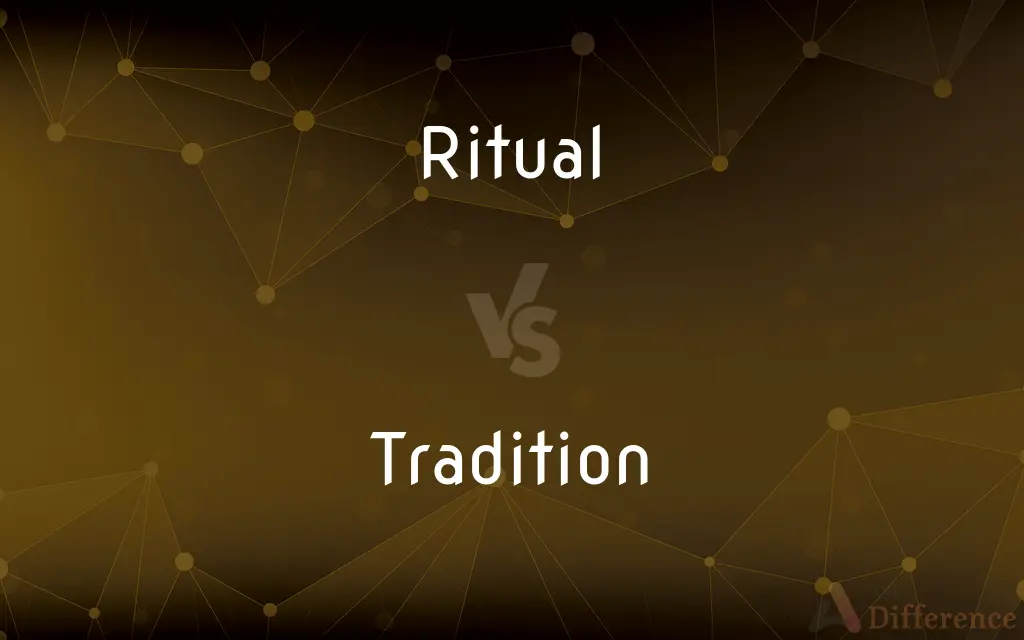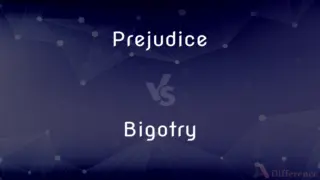Ritual vs. Tradition — What's the Difference?
Edited by Tayyaba Rehman — By Fiza Rafique — Updated on October 29, 2023
Ritual is a specific set of actions performed for a symbolic reason; tradition is a long-standing custom or belief passed down through generations.

Difference Between Ritual and Tradition
Table of Contents
ADVERTISEMENT
Key Differences
Rituals involve a specific series of actions done in a particular sequence, generally with symbolic meaning or purpose. Traditions, on the other hand, are practices, beliefs, or customs that are handed down through generations and may or may not involve specific actions.
While rituals often have religious or spiritual significance, they can also be secular in nature, like a daily skincare routine. Traditions, conversely, can encompass a wide range of activities or beliefs, from family recipes to historical commemorations.
Rituals are often parts of broader traditions. For example, lighting a candle might be a ritual in a tradition of celebrating someone's birthday. On the other hand, the entire act of celebrating birthdays with cakes and gifts can be considered a tradition.
To understand the distinction further, rituals are more about "how" something is done, emphasizing the method or procedure. Tradition focuses on "what" is passed down and "why" it continues to be valued and preserved.
Comparison Chart
Nature
Set of symbolic actions.
Long-standing custom or belief.
ADVERTISEMENT
Timeframe
Can be short-lived or longstanding.
Passed down through generations.
Context
Often religious or ceremonial.
Can be familial, cultural, or societal.
Flexibility
Usually has a strict sequence.
Can evolve over time.
Examples
Baptism, lighting a candle.
Celebrating holidays, family recipes.
Compare with Definitions
Ritual
Symbolic actions performed regularly.
Every morning, his coffee-making ritual was the same.
Tradition
A belief or behavior with historical roots.
The tradition of hanging stockings started centuries ago.
Ritual
Established method of doing something.
Her beauty ritual took over an hour.
Tradition
Continuation of past practices.
Singing the alma mater is a school tradition.
Ritual
A ceremonial act with a set sequence.
The ritual of lighting candles is essential to the ceremony.
Tradition
Method or idea preserved over time.
The art of making handmade pottery is a cherished tradition in the village.
Ritual
A ritual is a sequence of activities involving gestures, words, actions, or objects, performed according to a set sequence. Rituals may be prescribed by the traditions of a community, including a religious community.
Tradition
Custom passed down through generations.
The tradition of gathering for Thanksgiving dinner brings families together.
Ritual
A ceremony in which the actions and wording follow a prescribed form and order.
Tradition
Established practice in a culture.
In their tradition, the eldest son inherits the family estate.
Ritual
The body of ceremonies or rites used in a place of worship or by an organization
According to Catholic ritual.
Tradition
A tradition is a belief or behavior (folk custom) passed down within a group or society with symbolic meaning or special significance with origins in the past. A component of folklore, common examples include holidays or impractical but socially meaningful clothes (like lawyers' wigs or military officers' spurs), but the idea has also been applied to social norms such as greetings.
Ritual
A book of rites or ceremonial forms.
Tradition
The passing down of elements of a culture from generation to generation, especially by oral communication
Cultural practices that are preserved by tradition.
Ritual
A set of actions that are conducted routinely in the same manner
My household chores have become a morning ritual.
Tradition
A mode of thought or behavior followed by a people continuously from generation to generation; a custom or usage
The traditions of Tibetan Buddhism.
Ritual
(Zoology) A set of actions that an animal performs in a fixed sequence, often as a means of communication
The greeting ritual in baboons.
Tradition
A set of such customs and usages viewed as a coherent body of precedents influencing the present
Followed family tradition in dress and manners.
Ritual
Associated with or performed according to a rite or ritual
A priest's ritual garments.
A ritual sacrifice.
Tradition
A precept or a body of precepts that are not written in the sacred book of a religion, such as the Bible, but are considered holy or true.
Ritual
Being part of an established routine
A ritual glass of milk before bed.
Tradition
A style or method of an activity or practice, especially of artistic expression, that is recognized and sometimes imitated
Satire in the tradition of Jonathan Swift.
Ritual
Related to a rite or repeated set of actions.
They performed the ritual lighting of the candles.
Tradition
A piece of folklore
"a popular medieval tradition that identified the queen of Sheba with the Blessed Virgin Mary" (Nicholas Clapp).
Ritual
A rite; a repeated set of actions.
The priests carried out the religious ritual carefully.
Tradition
A part of culture that is passed from person to person or generation to generation, possibly differing in detail from family to family, such as the way to celebrate holidays.
Ritual
Of or pertaining to rites or ritual; as, ritual service or sacrifices; the ritual law.
Tradition
A commonly held system. en
Ritual
A prescribed form of performing divine service in a particular church or communion; as, the Jewish ritual.
Tradition
An established or distinctive style or method:
Ritual
Hence, the code of ceremonies observed by an organization; as, the ritual of the freemasons.
Tradition
The act of delivering into the hands of another; delivery.
Ritual
A book containing the rites to be observed.
Tradition
(obsolete) To transmit by way of tradition; to hand down.
Ritual
Any customary observance or practice
Tradition
The act of delivering into the hands of another; delivery.
Ritual
The prescribed procedure for conducting religious ceremonies
Tradition
The unwritten or oral delivery of information, opinions, doctrines, practices, rites, and customs, from father to son, or from ancestors to posterity; the transmission of any knowledge, opinions, or practice, from forefathers to descendants by oral communication, without written memorials.
Ritual
Stereotyped behavior
Tradition
Hence, that which is transmitted orally from father to son, or from ancestors to posterity; knowledge or belief transmitted without the aid of written memorials; custom or practice long observed.
Will you mock at an ancient tradition begun upon an honorable respect?
Naught but tradition remains of the beautiful village of Grand-Pré.
Ritual
Of or relating to or characteristic of religious rituals;
Ritual killing
Tradition
An unwritten code of law represented to have been given by God to Moses on Sinai.
Making the word of God of none effect through your tradition, which ye have delivered.
Ritual
Of or relating to or employed in social rites or rituals;
A ritual dance of Haiti
Sedate little colonial tribe with its ritual tea parties
Tradition
That body of doctrine and discipline, or any article thereof, supposed to have been put forth by Christ or his apostles, and not committed to writing.
Stand fast, and hold the traditions which ye have been taught, whether by word or our epistle.
Ritual
Religious or spiritual ceremony.
The tribe's rain dance ritual was captivating.
Tradition
To transmit by way of tradition; to hand down.
The following story is . . . traditioned with very much credit amongst our English Catholics.
Ritual
A routine that provides comfort.
Reading before bed was her nightly ritual.
Tradition
An inherited pattern of thought or action
Tradition
A specific practice of long standing
Common Curiosities
How is ritual different from habit?
A ritual often has symbolic significance, whereas a habit is a regular behavior often done unconsciously.
Is every ritual a tradition?
No, while rituals can be part of traditions, not every ritual is a longstanding practice passed through generations.
Can traditions change over time?
Yes, traditions can evolve or adapt over time while still preserving their core essence.
Is tradition always tied to the past?
While traditions have historical roots, they can be created in the present and become meaningful over time.
Why are traditions important?
Traditions provide cultural identity, continuity, and a sense of belonging and connection to the past.
Can one tradition have multiple rituals?
Absolutely, a single tradition can encompass various rituals associated with it.
Can something new become a tradition?
Yes, new practices can become traditions if they gain significance and are passed down over time.
Do rituals always require physical actions?
Most rituals involve physical actions, but some might involve spoken words or meditative practices.
Is every tradition tied to a specific culture?
While many traditions are culturally specific, some traditions transcend cultures and are universal.
Are all rituals religious?
No, rituals can be secular, like a bedtime routine or a graduation ceremony.
Can a ritual become a tradition?
Yes, if a ritual is practiced consistently over generations, it can become a tradition.
Can traditions exist without rituals?
Yes, traditions can be beliefs, stories, or practices that don't involve specific ceremonial actions.
What makes something a ritual?
A ritual involves specific actions done in sequence with symbolic or ceremonial importance.
How does one differentiate between ritual and tradition?
Ritual focuses on the "how," emphasizing procedure; tradition focuses on "what" is passed down and its significance.
Can rituals and traditions coexist?
Yes, often rituals are components of broader traditions, coexisting harmoniously.
Share Your Discovery

Previous Comparison
Prejudice vs. Bigotry
Next Comparison
Schedule vs. CalendarAuthor Spotlight
Written by
Fiza RafiqueFiza Rafique is a skilled content writer at AskDifference.com, where she meticulously refines and enhances written pieces. Drawing from her vast editorial expertise, Fiza ensures clarity, accuracy, and precision in every article. Passionate about language, she continually seeks to elevate the quality of content for readers worldwide.
Edited by
Tayyaba RehmanTayyaba Rehman is a distinguished writer, currently serving as a primary contributor to askdifference.com. As a researcher in semantics and etymology, Tayyaba's passion for the complexity of languages and their distinctions has found a perfect home on the platform. Tayyaba delves into the intricacies of language, distinguishing between commonly confused words and phrases, thereby providing clarity for readers worldwide.














































